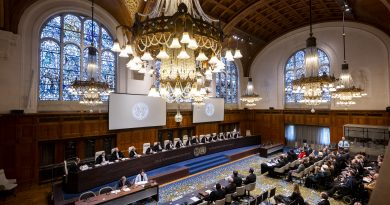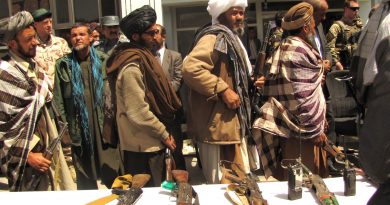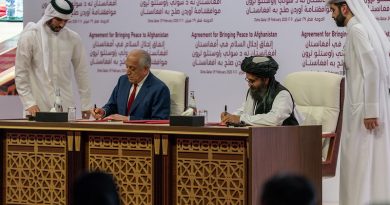Book Review: Islam and the Future of Tolerance
ISLAM AND THE FUTURE OF TOLERANCE
A Dialogue
Maajid Nawaz and Sam Harris
128 pp. Harvard University Press, 2015. $11.50.
ISBN 9780674088702
By Gabrielle Hunt
Staff Writer
In “Islam and the Future of Tolerance: A Dialogue,” an unlikely duo — former Islamist Maajid Nawaz and staunch secularist Sam Harris — come together to debate the causes of extremism, dissect the nuances of how the West understands Islam, and discuss possible means of encouraging tolerance.
For most of the book, Harris facilitates the discussion by posing questions to Nawaz. To some, the dialogue format may seem inauthentic and scripted — the flow of discussion appears too seamless, which is either a testament to good editing or a failure to make it sound like a conversation that actually happened.
Although the authors seem almost too nice to each other, the book’s conversational style is clever and strategic. The dialogue encourages the type of tolerant discussion Nawaz and Harris use to engage one another. To classicists, the book’s continuous dialectic will be reminiscent of Plato’s “Symposium” — the purposeful cordiality and thoughtfulness put into each response from both Nawaz and Harris demonstrates the tact and weight missing from many conversations and debates in today’s world of instant gratification and virtual noise.
In addition to the narrative style, there are four major points that students and scholars of international relations and politics should take note of in “Islam.”
The first, made by Nawaz, is that international grievances are not the root cause of Islamic radicalization. According to Nawaz, this excuse “pins the blame on foreign policy” and remains “only half the story” — the source of extremism is less due to frustrations over foreign intervention than we think.
The theory of grievances has been adopted by many scholars of international relations and terrorism to explain the origins of radicalization. But this theory seeks to divorce religious causes from motivation and action, and instead to explain radicalization as an effect of political and economic disillusionment or failure.
“Where grievances are relevant is in priming young, vulnerable individuals who are experiencing a profound identity crisis to receive ideological dogma through charismatic recruiters,” Nawaz said.
By suggesting that religious conviction is a greater factor than we have come to believe, Nawaz reveals a dilemma: How do we expand our understanding of Islamist extremism to include an unavoidable connection to the religion without perpetuating Islamophobia?
This dilemma is addressed by Nawaz in his second point, which he calls the “betrayal of liberalism:” essentially, in an effort to remain respectful of foreign cultures, many liberals adopt a laissez-faire approach, which may excuse backward practices and sympathize with extremism. Nawaz says that liberals who “hold hands” with Islamists in the name of respect believe that they are doing Muslims a favor, when in fact, they are surrendering Muslims who seek reform. He further stresses the importance of recognizing that promoting human rights is not disrespectful — certain values should transcend culture.
But Nawaz’s third point is that although it is possible that some liberals inadvertently promote sympathy to Islamists, we must still practice cultural sensitivity when promoting the values of the “free world.”
In true Socratic fashion, neither Nawaz nor Harris fully answer the questions they have posed. Because of the open-endedness of the book, a few unanswered questions are potentially problematic, especially in the face of rampant Islamophobia in the United States. It is undoubtedly impossible to completely sever Islam, the religion, from Islam, the political ideology. It is crucial, however, for the United States to remain open to the grievance narrative, rather than religious ideology, to explain radicalization. Perhaps this is dishonest, but it could prevent aggravating a negative public perception of Muslims.
Nawaz makes a fourth point that the “first stage in the empowerment of any minority community is the liberation of reformist voices within that community so that its members can take responsibility for themselves and overcome the first hurdle to genuine empowerment: the victimhood mentality.”
Again, this is problematic in the context of the United States’ sociopolitical climate. Though there is a certain responsibility all communities must adopt to promote progress and change, if taken out of context, this argument potentially gives legitimacy to the widespread sentiment that moderate Muslims should speak out in favor of “good representatives of Islam” and against “bad representatives of Islam” (i.e., the Islamic State group). This would place the onus too heavily on a community that has no obligation (at least in the United States) to explain its identity, and reinforces prejudices demanding that tolerance must be earned.
Stepping away from these larger unanswered questions, two topics that Nawaz and Harris address quite well are that there is a distinction between Islamism and jihadism, and that multiple accepted interpretations of the Quran exist.
Harris simplifies Nawaz’s explanation of the difference between Islamism and jihadism: “An Islamist attempts to impose his version of Islam on the rest of society, and a jihadist is an Islamist who attempts to do so by force.” Perhaps the distinction is not entirely necessary to strengthen our understanding of extremism, but it is a helpful clarification to prevent interchanging two terms that do not mean the same thing.
The discussion on the various interpretations of the Quran is a fascinating section that focuses on the nuances of Arabic words and the different applications of interpretative methodologies. Perhaps the greatest take-away from it is that leaning toward a progressive reading of the Quran can help delegitimize and eradicate the ills of the Muslim world, including the Islamic State, as a means of cultural reformation.
“The only truth is that there is no correct way to interpret scripture. When you open it up like that, you’re effectively saying there is no right answer. And in the absence of a right answer, pluralism is the only option,” Nawaz says.
The most interesting aspect of “Islam” is its attention to the complexity of identity. This is a discussion and meditation on reality that all of us would be wise to consider, regardless of interest in international relations, Islam, or basic tolerance. What leads us to become tolerant? What leads us to become intolerant? These existential questions bring to mind an intriguing thought from Harris: “In fact, one could say that the whole of life is one long identity crisis.”



